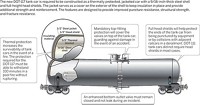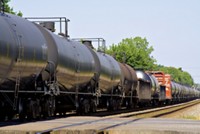Advertisement
Grab your lab coat. Let's get started
Welcome!
Welcome!
Create an account below to get 6 C&EN articles per month, receive newsletters and more - all free.
It seems this is your first time logging in online. Please enter the following information to continue.
As an ACS member you automatically get access to this site. All we need is few more details to create your reading experience.
Not you? Sign in with a different account.
Not you? Sign in with a different account.
ERROR 1
ERROR 1
ERROR 2
ERROR 2
ERROR 2
ERROR 2
ERROR 2
Password and Confirm password must match.
If you have an ACS member number, please enter it here so we can link this account to your membership. (optional)
ERROR 2
ACS values your privacy. By submitting your information, you are gaining access to C&EN and subscribing to our weekly newsletter. We use the information you provide to make your reading experience better, and we will never sell your data to third party members.
Safety
Chemical Shippers Seek Tank Car Rule Exemption
by Glenn Hess
July 6, 2015
| A version of this story appeared in
Volume 93, Issue 27
The chemical industry is urging the Department of Transportation to revise its recently issued tank car rule, saying new retrofitting requirements should apply only to railcars carrying crude oil and ethanol. The rule establishes new safety standards for trains carrying flammable liquids, including a schedule for retrofitting or replacing existing tank cars with a sturdier model (C&EN, May 25, page 29). In an appeal filed by the American Chemistry Council (ACC), the industry group says the rule’s tank car requirements should apply only to shipments of flammable liquids that “pose the highest risk,” namely crude oil and ethanol. ACC notes that liquid chemicals are shipped in relatively small quantities on trains carrying a variety of different products. In contrast, crude oil and ethanol are moved in large blocks of tank cars. DOT has concluded that these so-called unit trains are more difficult to control and are more likely to derail. But ACC argues that the rule is so broad that it potentially applies to all tank cars used to transport flammable liquids.







Join the conversation
Contact the reporter
Submit a Letter to the Editor for publication
Engage with us on Twitter